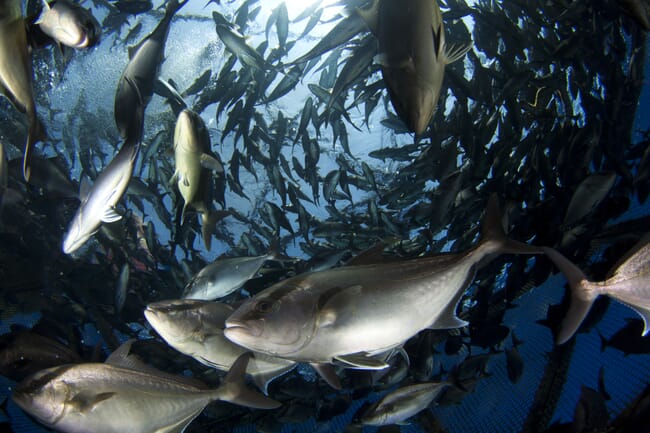According to the poll , 84 percent of voters support a proposal that “would first examine the risks and opportunities of fish farming in US federal waters before setting high standards and regulation for safe and sustainable aquaculture.”
The poll comes as there has been growing interest in aquaculture in US federal waters. Internationally, the near-and-offshore aquaculture industry is well-established. Americans import more than 85 percent of all the seafood they eat, and more than half of that is farmed. But it often comes from countries that lack strong standards for safety and sustainability.

© Jeff Milisen, Ocean Era
“Americans value local seafood and want to know that the fish they eat is caught or raised safely and sustainably,” said Eric Schwaab, senior VP for ecosystems and oceans at EDF in a press release. “As aquaculture is increasingly a part of our seafood choices, special efforts are needed to get aquaculture right. By developing a new national standard, the United States can lead the way in ensuring that we meet consumer demand and grow local business while also reducing the environmental footprint of food production.”
Nearly 70 percent of respondents who eat seafood are concerned about where it comes from, and across the board, nearly 9 in 10 voters signal that increasing regulations, setting higher standards for seafood, making seafood more sustainable for the long term and reducing the environmental harms that can result from fish farming are priorities.
These concerns cut across the aisle, too — with 92 percent of Democrats, 86 percent of Republicans and 85 percent of Independents overwhelmingly agreeing on the need for stronger regulations on seafood sold in the U.S.
Like other forms of food production, aquaculture has its risks, and voters are concerned about the health and environmental impacts of both foreign and domestic aquaculture. However, 73 percent of voters say they are likely to eat more seafood if it was raised or caught in the United States and 71 percent are likely to eat more if it came from sources that will sustainably continue to provide seafood over the long term.
“We already benefit from nearshore aquaculture for things like shellfish and seaweed. We have the opportunity to proactively set a high sustainability bar for offshore aquaculture in federal waters,” Schwaab added.
That’s why EDF announced its recent initiative to ensure that domestic aquaculture in the US is done in the most environmentally sustainable way possible and prioritises economic growth and jobs for historically disadvantaged communities: those experiencing the greatest burdens of environmental harm, economic inequality and climate change.
With the right regulatory and policy framework, both wild-capture fisheries and offshore aquaculture can be part of a healthy ocean strategy that protects marine life, puts protein on our plates that produce fewer carbon emissions than land-based proteins and delivers good jobs and economic growth to a diverse array of Americans. But there is more work to do before that becomes a reality.
That’s why EDF is:
- Researching, identifying and prioritizing key issues in offshore aquaculture that would benefit from further study, including the impacts of escapes, localized pollution concerns, environmentally responsible approaches to feed and other critical issues.
- Working with experts and policymakers to develop legislation to examine the most significant issues and help to shape a strong regulatory framework for safe, sustainable and environmentally sound aquaculture.
- Advocating for an expanding aquaculture industry that will be as inclusive as possible, connecting the opportunities and benefits to more Americans.


